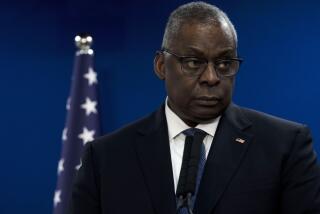Gates sees no evidence top Pakistani officials knew of Bin Laden’s hide-out
- Share via
Reporting from Washington — Osama bin Laden’s hide-out was probably known to “somebody” in Pakistan before the U.S. raid that killed him, but there is no sign that senior Pakistani officials were aware of the Al Qaeda leader’s location, Defense Secretary Robert M. Gates said Wednesday.
In fact, since the operation, the U.S. has seen some indications that top Pakistani officials were unaware that Bin Laden was hiding in the town of Abbottabad until after a team of U.S. Navy SEALs killed him in his bedroom May 2.
“I have seen no evidence at all that the senior leadership knew. In fact, I’ve seen some evidence to the contrary,” Gates said at a Pentagon news conference. “We have no evidence yet with respect to anybody else. My supposition is, somebody knew.”
Gates did not describe the evidence indicating that top Pakistani officials were surprised to learn of Bin Laden’s whereabouts, and aides refused to clarify his remarks. The U.S. is likely to have monitored communications among Pakistani officials during and after the raid, but the evidence might also have come from conversations between U.S. and Pakistani officials or from other intelligence reports.
Bin Laden’s whereabouts might have been known by mid-level Pakistani officials or retired military officers, Gates said, but “it’s hard to go to them with an accusation when we have no proof.”
U.S. intelligence agencies were examining notebooks, computer data and other material seized in Bin Laden’s compound, a process Gates said would take time.
Gates and Navy Adm. Michael G. Mullen, chairman of the Joint Chiefs of Staff, warned against calls — from Congress and elsewhere — to punish Pakistan by reducing U.S. aid or tying assistance to specific moves against militant groups operating near the country’s rugged border with Afghanistan.
Both said they felt the same frustration as many U.S. lawmakers over Pakistan’s failure to address the militant threat within its borders more aggressively. But the U.S. has “significant interests” in Pakistan that could be jeopardized by cutting off aid, Gates said.
Pakistan’s armed forces were humiliated by the U.S. operation, and “we have to recognize they see a cost in that and a price has been paid,” Gates said.
On a visit to Islamabad, the Pakistani capital, this week, Sen. John F. Kerry (D-Mass.) delivered a stern message that Washington would not tolerate Pakistan providing sanctuary to Al Qaeda and allied militant groups that target Western interests.
Pakistani officials, for their part, have been furious over not being told beforehand of the raid at the Bin Laden compound, a precaution U.S. officials say was necessary to maintain the operation’s secrecy.
More than any other Pentagon official, Mullen has worked to form a close relationship the with head of Pakistan’s army, Gen. Ashfaq Kayani, whom Mullen described as “not just a peer” but “a friend.” The Pakistani military was undergoing “soul searching” in the wake of the U.S. operation, Mullen said.
More to Read
Sign up for Essential California
The most important California stories and recommendations in your inbox every morning.
You may occasionally receive promotional content from the Los Angeles Times.












